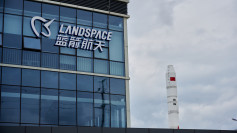The Biden administration is poised to introduce a new rule next month aimed at expanding U.S. powers to restrict semiconductor manufacturing equipment exports to China. However, key allies such as Japan, the Netherlands, and South Korea will be exempt from these restrictions, sources familiar with the matter revealed, according to Reuters.
This forthcoming rule represents an extension of the Foreign Direct Product rule, which prohibits the sale of products made using American technology to certain countries. The targeted regulation will significantly affect approximately half a dozen Chinese semiconductor fabrication plants at the forefront of China's advanced chipmaking efforts.
The exemptions granted to major chip equipment manufacturers like ASML and Tokyo Electron have sparked positive market reactions. Shares of ASML surged by 7% in Amsterdam trading, while Tokyo Electron's stock closed 7.4% higher. Other Japanese chip equipment makers, including Screen Holdings and Advantest, also saw substantial gains, rising 9% and 4.5%, respectively.
The rule aims to impede China's progress in supercomputing and artificial intelligence (AI), areas that could potentially bolster the Chinese military's capabilities. While the Biden administration continues to pressurize China's semiconductor sector, it is carefully balancing diplomatic relationships with its allies.
A U.S. official, who chose to remain anonymous, emphasized the importance of international cooperation in implementing effective export controls. "Effective export controls rely on multilateral buy-in. We continually work with like-minded countries to achieve our shared national security objectives," the official stated.
The new rule, currently in draft form, also seeks to close loopholes in the existing Foreign Direct Product rule. For instance, equipment could fall under export controls simply because it contains a chip made with U.S. technology. Additionally, about 120 Chinese entities, including several chipmaking factories, toolmakers, and providers of electronic design automation (EDA) software, are expected to be added to the U.S. restricted trade list.
Despite the impending rule, the Chinese government has voiced strong opposition. Chinese Foreign Ministry spokesperson Lin Jian criticized the U.S. efforts to suppress China's semiconductor industry, claiming it undermines global trade and damages all parties involved. Lin asserted that such measures would only strengthen China's resolve to develop its technological self-reliance.
The planned exemptions underscore the U.S. administration's need for diplomatic tact when imposing these restrictions. The Commerce Department categorizes countries based on diplomatic relationships and security concerns, which helps determine licensing requirements and streamline export control regulations.
The anticipated rule reflects the U.S.'s broader strategy to maintain technological superiority while ensuring national security. This strategy involves a delicate balance of restricting technological advancements in rival nations without alienating crucial allies.
ASML, headquartered in the Netherlands, and Tokyo Electron, a leading semiconductor equipment manufacturer in Japan, are critical players in the global semiconductor supply chain. Their exemption from the new U.S. rule highlights their strategic importance. Both companies' shares had previously dropped following a Bloomberg report suggesting they would be included in the expanded restrictions.
The rule's impact will extend beyond China, affecting exports from countries like Israel, Taiwan, Singapore, and Malaysia. Taiwan, home to TSMC, the world's largest chip manufacturer, will be particularly impacted.
The Commerce Department declined to comment on the specifics of the new rule. However, the agency is expected to publish a preliminary version next month. This development marks a significant step in the U.S. government's ongoing efforts to curb China's advancements in critical technologies while maintaining robust alliances with key global partners.




